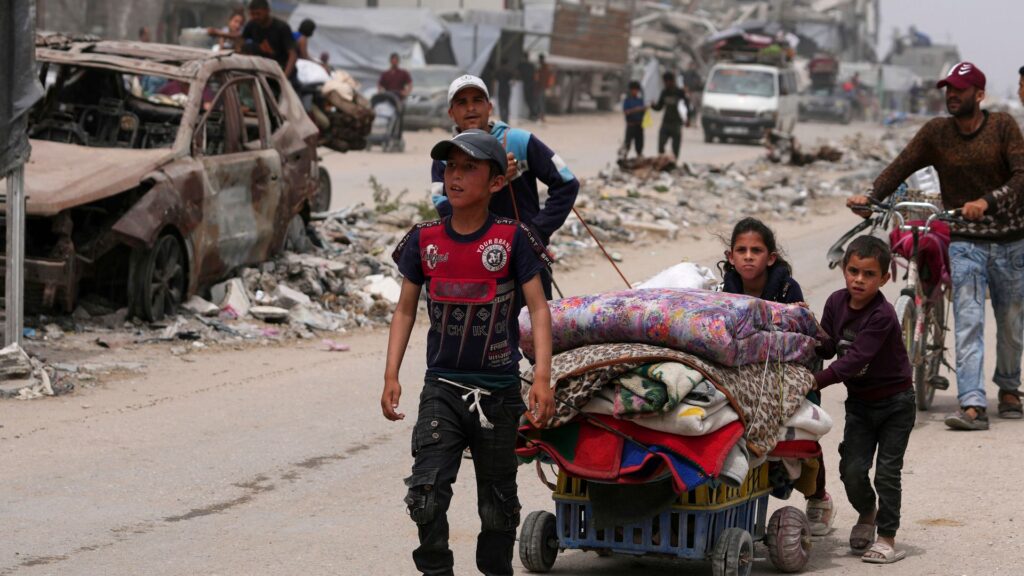The Israeli Defense Forces (IDF) undertook “extensive ground operations” in Gaza on Saturday night, May 17, into Sunday, marking an escalation of its newly launched Operation Gideon’s Chariots that’s targeting the territory’s north and south. Meanwhile, more than 130 people were killed in overnight airstrikes, as indirect ceasefire negotiations between Hamas and Israel continued into their second day.
What has Gideon’s Chariots accomplished in 48 hours?
Israel is ramping up its pressure campaign on Hamas, with the goal of getting the group to release all of the remaining hostages it holds, both dead and alive. The Israeli government, led by Prime Minister Benjamin Netanyahu, is also demanding that Hamas fully withdraw from the Gaza Strip and completely disarm the territory.
The IDF said that over the past week, it has struck 670 targets and killed dozens of militants. One of those strikes is believed to have killed Hamas’ leader, Mohammed Sinwar, though the IDF is yet to confirm the reports. His body was reportedly recovered five days after a bombardment that targeted a tunnel network in the southern city of Khan Younis.
Also in Khan Younis, more than 48 people were killed when overnight airstrikes hit residential homes and tents housing those who have been displaced. Meanwhile, in the northern Jabaliya refugee camp, nine members of one family were killed, as well as another 10 in a residential area. Between the strikes, 25 children and 14 women were killed, according to reporting from The Associated Press.
In the 24 hours prior, Israel’s offensive killed more than 150 people, Gaza’s Health Ministry stated, including four children in a northern refugee camp on Saturday. Another 14 people were killed in central Gaza, including two parents and their four children, when their home was attacked.
The country routinely blames civilian deaths on Hamas, saying the group embeds itself in civilian infrastructure. Israel also claims that the group intercepts humanitarian aid to keep its militarized force operating.
Israel provides little evidence to support these claims, which are summarily denied by Hamas. Human rights groups and officials with the United Nations also accuse Israel of targeting Gaza’s health care facilities and blocking aid from reaching Gaza’s population, which is currently gripped by widespread famine.
No progress in ceasefire negotiations
Now in their second day of indirect negotiations, a senior Israeli official said there had been no progress in the talks, given each side’s demands. Similarly, speaking to Reuters, a Hamas official said, “Israel’s position remains unchanged, they want to release the prisoners (hostages) without a commitment to end the war.”
An anonymous source who spoke to the al-Araby al-Jadeed news site in Qatar, which is acting as a mediator and host in the talks, said that a potential ceasefire would include the release of 10 living hostages in exchange for between 200 and 250 Palestinian prisoners. Additionally, the ceasefire would last for one and a half to two months. On the 10th day of the ceasefire, Hamas would be expected to deliver a list detailing the health and status of the remaining 58 hostages it holds.
Hamas is also demanding that the international community, including the United States, enforce security guarantees that won’t allow Israel to resume its war after all of the hostages are released.
Israel has been working to systematically decimate Hamas since the militant group launched a surprise attack on Israel on Oct. 7, 2023, killing roughly 1,200 people and taking 251 hostage. Since then, Israel has killed upwards of 53,000 Palestinians, most of whom are civilians, while displacing nearly the entire population of Gaza’s 2.3 million residents.
While 58 hostages, both dead and alive, are believed to be held by Hamas, the Palestinian Commission of Detainees Affairs reports that more than 10,100 Palestinians are detained in Israel, including more than 400 children.
“When the Jews want a truce, Hamas refuses, and when Hamas wants a truce, the Jews refuse it. Both sides agree to exterminate the Palestinian people,” Abu Mohammad Yassin, a resident of the Jabaliya refugee camp, told the AP.


